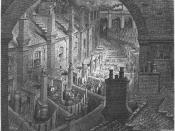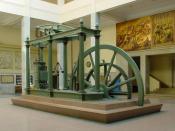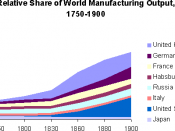From the onset of the nineteenth century, paramount strides were made in technological advancement, particularly throughout Europe. Human and animal labour came to be substituted by mineral power, such as coal; water and steam; and hand tools were replaced by the machine. This Industrial Revolution was pioneered by Great Britain, and occurred much later in France, Germany, and Central Europe. The mechanization of production was paralleled by distinguished social changes, and everywhere, the new 'bourgeoisie' class of businessmen was gaining economic strength and demanding its share of political power.
The impacts of Industrialization were varied: It had similar repercussions everywhere on marriage and family life; it gave birth to new social classes; and it shed light on new ideologies, particularly social Darwinism, the theories of natural selection and survival of the fittest, and forces aimed at toppling capitalism. It promoted migration from the farms in the countryside, to the city, and between towns, as well as to other countries, particularly across the Atlantic.
Industrialization also led to Standardization and Urbanization of society.
As industry mushroomed, larger amounts of capital were needed. Combinations of capitalists were required to provide the necessary funding. By the latter part of the nineteenth century, corporations became the dominant form of business enterprise, providing larger sums of money than individual businessmen could hope to accumulate. This provided more purchasing power in the developing countries.
It was the Industrial Revolution, along with an unprecedented rise in population, that brought about the real expansion of European cities'. (A brief history of Western Man, pg 458). Although the drift from farm to city had existed long before the Industrial Revolution, Industrialization served to precipitate this sort of migration. Hence the trend of man, to travel from nature dominated-surroundings, to a mad-made environment, which had persisted over centuries,


